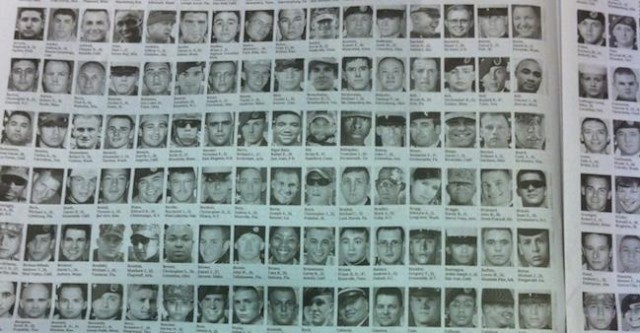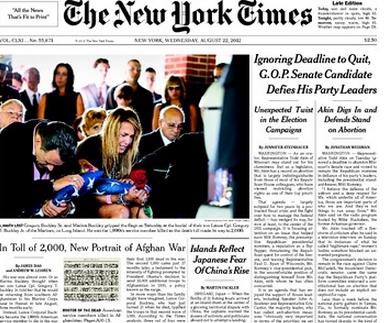2,003 Soldiers Dead in Afghanistan, And What Happens After

Today’s New York Times has a four-page spread with the names and faces of American servicemen and women who have been killed in the war in Afghanistan.
• Here you can see the faces and read the names of each man and woman killed.
• Here you can see visualizations of where and when the deaths occured.
• Here you can read about the NYT’s methodology for counting the deaths. (Some deaths in countries other than Afghanistan have been included because they were directly related to Operation Enduring Freedom; six “non-hostile” deaths of servicemembers at Guantanamo are included; they do not say whether soldiers who take their own lives or die from related injuries after returning to the States are included, though the accompanying feature article notes, “More active-duty and reserve soldiers killed themselves last year, 278, than died in combat in Afghanistan, 247.”)


This photograph by Todd Heisler for the NYT prompted me to spend the morning seeking out what happens financially and logistically after a service member dies in action. This pamphlet from the Department of Defense — “A Survivor’s Guide to Benefits: Taking Care of Our Families” — details the process of applying for benefits, and it’s complicated. There are so many (death gratuity, housing allowance, dependency and indemnity compensation, survivor benefit plan … ), and families have to apply for each benefit separately. It seems overwhelming.
But each branch assigns a Casualty Assistance Officer to each family, and according to this guide, that person’s main responsibility from point of assignment is to ensure the family’s questions are answered and benefits applied for. It seems like a good system. (I suppose I could seek out message boards to back that assumption up or refute it, but my heart isn’t in it this morning.)
One thing that struck me particularly: “The death gratuity is a lump sum payment made by the Department of Defense to the survivors … The amount of death gratuity is $100,000 and is tax exempt … The death gratuity will normally be paid to the eligible beneficiaries within seventy-two hours of notification.”
I can’t see any benefit in waiting to pay this benefit out — despite military help with funeral costs and travel, I’m sure many families find that money useful immediately. But to have a check arrive so soon after that knock on the door …
Support The Billfold
The Billfold continues to exist thanks to support from our readers. Help us continue to do our work by making a monthly pledge on Patreon or a one-time-only contribution through PayPal.
Comments